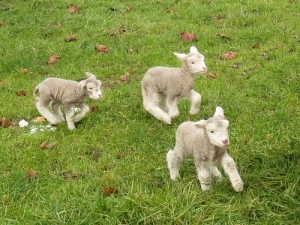Move over ham, here comes lamb
It’s official, lamb will take centre stage on Kiwi Christmas tables this year.
 BLNZ's Lamb Crop 2015 report estimates 23.9 million lambs were tailed this spring – the smallest lamb crop since 1953.
BLNZ's Lamb Crop 2015 report estimates 23.9 million lambs were tailed this spring – the smallest lamb crop since 1953.
White the lamb crop is the lowest since 1953, sheep farmers have become much more productive, says Beef + Lamb NZ chief economist Andrew Burtt.
He says there is still constant tension and pressure to improve efficiency and productivity.
"Farmers have responded to the signals from processors about lambs in tight specifications. That sort of thing will just continue," he adds.
BLNZ's Lamb Crop 2015 report estimates 23.9 million lambs were tailed this spring – the smallest lamb crop since 1953. Lamb export receipts for 2015-16 are estimated at $2.8 billion, down 4.2% on 2014-15.
Burtt says demand, overseas markets, currency rates and interest rates are constantly moving factors that farmers do not directly control.
"Their best focus is on the things they do have some control over, which is their productivity in getting the weights desired by their customers, the meat companies. They're doing the best they can do as efficiently as possible."
The overall focus is an increasing demand to grow animals to specifications.
He says sheep numbers fell because of key factors like drought; and dairy cows are expected to have the first noticeable downturn in a long time – driven by prices and drought. However, the decline in beef cattle numbers has slowed substantially.
"But sometimes we miss the story if we focus solely on the number of sheep or beef cattle," Burtt adds.
"We miss the productivity improvements through farm management and pasture management; all farmers know about El Nino and make and implement their plans to deal with El Nino should it eventuate.
"There are some [farmers] in Hawkes Bay who say it has rained so much at present that 'if this is El Nino bring it on'. Nevertheless they are working on the prospect of dry conditions later in the year.
"I think that responsiveness and resilience to these sorts of things is getting stronger and stronger in the industry, nevertheless there are still improvements in confidence needed."
Regarding the Silver Fern Farms investment by the Chinese company Shanghai Maling, Burtt says it shows there is enough confidence in the industry for people to invest in it.
New Zealand's new Special Agricultural Trade Envoy, Horowhenua dairy farmer, company director and former Minister of Agriculture, Nathan Guy says the Free Trade Agreement (FTA) with India is a good deal for the country.
New figures show dairy farmers are not only holding on to their international workforce, but are also supporting those staff to step into higher-skilled roles on farm.
New tractor deliveries for 2025 jumped 10% compared to the previous year, a reflection of the positive primary sector outlook, according to the Tractor and Machinery Association (TAMA).
Entries have opened for two awards in the New Zealand Dairy Industry Awards (NZDIA) programme, aimed at helping young farmers progress to farm ownership.
Federated Farmers has confirmed interim chief executive Mike Siermans to the role.
Registrations are now open for the 2026 Ruralco Golf Classic, with all proceeds from the event set to support the Mid Canterbury Rural Support Trust.